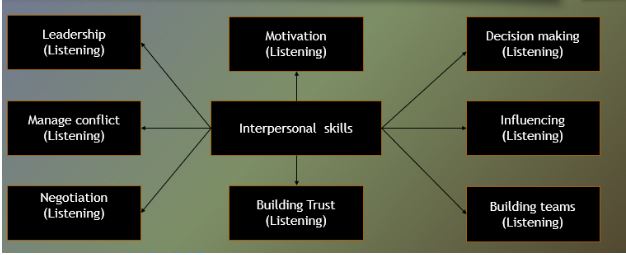
How to Be a Leader by Mastering Active Listening, Part 1
Active listening is essential in our collaboration, meetings, and solving disputes or conflicts
How to Be a Leader by Mastering Active Listening and Why Do Managers/Leaders Fail?
The responsibilities of each one of us could vary. Still, we all have shared aspects of teamwork, meetings, planning and organizing the work, managing the day-to-day activities, identifying potential, and delivering projects. Active listening is essential in our collaboration, meetings, and solving disputes or conflicts:
- We are going to discuss the barriers that affect effective listening and how to overcome them.
- We will discuss how we are all leaders in our ways and how to be successful leaders.
- We will go through ways to overcome challenges by having strategies, resources, skills, and support.
Why Do We Need Active Listening?
We listen to obtain information, understand, and share experiences and points of view. Active listening determines ways/suggested solutions to meet all stakeholders’ shared goals and provides a good teamwork environment. It also provides good data for critical thinking. Critical thinking includes analysis and evaluation of an issue to make a judgment. Also Identify potentials is critical; one of the essential tools is to allow brainstorming between all team members at all company levels to get general feedback and suggestions that could help modify or enhance some of the processes to improve the outcomes.
Active listening requires communication. I was a panelist in a session on work/life balance for ACI (American Concrete institution); in October 2021, there was a discussion about what to do with a customer who calls during the weekend. To me, it is a simple plan and organize solution. I would communicate to them where their project stood and give them a realistic expectation of when they will get their work back. The only reason they are calling during the weekend is because of a lack of communication.
All of the above provide the ability to make reasonable decisions, solve a problem, develop alternate solutions, and look for root causes of issues or conflicts.
While I was looking into interpersonal skills for one of my management presentations, I found that all of them incorporate active listening aspects to be able to master those skills. Those Interpersonal skills include Leadership, Motivation, Decision making, managing conflict, Negotiation, Building Trust, Influencing, and Building teams. See figure 1.

I think the key point to focus on is what is in it for you? What are you trying to get out of the discussion?
What is Active Listening?
Active listening is for the individuals to accept different points of view, give attention to the big picture and small details. Also, it is one of the primary skills: writing, speaking, and listening.
How to Improve Active Listening Skills
Active listening can be improved by avoiding distractions and thinking of your answer before hearing the entire question or feedback. It also helps if you acknowledge and encourage people to continue expressing their points of view, clarifying sources, investigating, and clarifying conflict.
Why Do Managers/Leaders Fail?
Manager and leader role include; manage project processes, lead the team, apply tools, strategic planning, employee engagement surveys, customer relationship management, benchmarking and outsourcing.
To lead a team successfully and achieve company objectives, managers and leaders should use the following guiding principles to manage goals effectively:
- Align the individual and team objectives.
- Recognize individuals’ contributions.
- Make progress measurable and track it on an ongoing basis.
- Use continuous feedback. Provide both positive and constructive feedback to identify the performance issue and accomplishment.
You can see how active listening is essential in the list above.
Many factors affect managers/leaders’ failure based on recent studies, including:
- The wrong managers in the wrong position.
- The managers account for a high percentage of employees’ issues with engagement.
- Low employee engagement leads to low productivity
Also, common missteps that explain why managers/leaders fail:
- An open-door policy with employees is insufficient.
- Expect employees to come to them with problems.
Let’s talk about management challenges, mainly include:
- Achieving a stretch goal.
- Bringing out the best in your team.
- Dealing with underperforming and Outstanding employees.
- Setting and communicating expectations.
- Defining milestones.
- Responding to a crisis.
- Continuous Improvement (Lessons learns).
To build teamwork, leaders need to set a positive work environment and allow employees to express their misunderstandings or lack of knowledge. Likewise, the team members need to feel encouraged to ask for help and admit mistakes.
Solve Problems:
The best way to solve problems is to approach them without emotional attachment. We need to remove the feelings, which is the self-control part of emotional intelligence. Then you have simply a problem you need to solve. Also, use re-framing, critical thinking or design thinking, or any other problem-solving technique.
In closing, I highly recommend considering active listening with a win-win negotiation strategy. In this negotiation strategy, both parties gain an acceptable outcome and consider options for mutual gain.
Also, while actively listening to solve an issue, separate the people from the problem and focus on interests, not positions.
Try to use BATNA, which is an acronym of Best Alternative to a Negotiated Agreement. BATNA gives an advantageous alternative that a negotiator can take if negotiations fail. It requires developing a list of actions you to take if no agreement is reached. For example, improve some of the ideas and convert them into practical options to reach an agreement
I will discuss types of management and strategies in the upcoming part 2.








